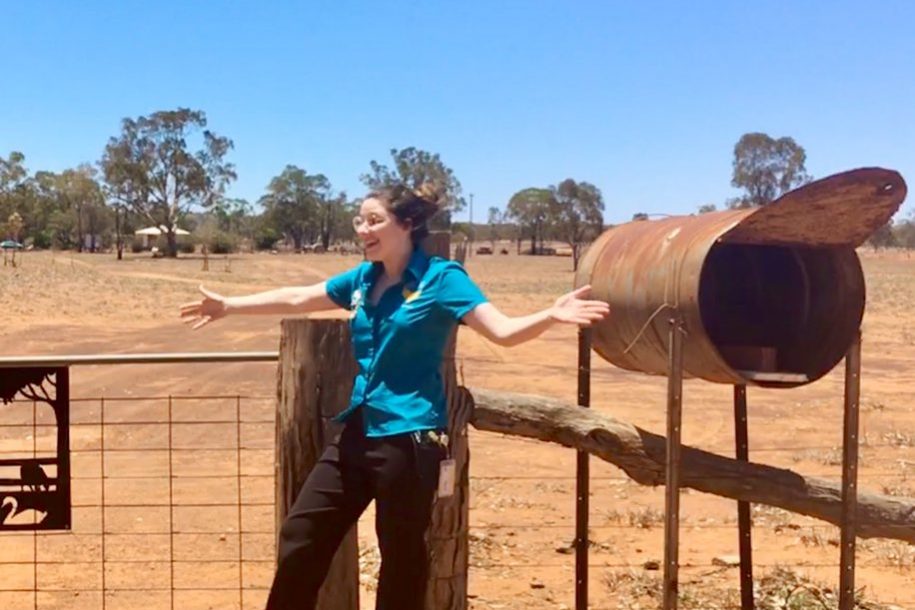Savannah taking in the outback scenery during a week of community nursing.
I must admit that when I was given the opportunity to complete a rural placement, I didn’t know what to expect. What would this new experience entail? What were the nursing quarters like? How would I fare alone, six hours drive away from home? Here, I offer you an insight into my placement experience and the five biggest takeaways from my time there.
-
A cultural experience
What became apparent early on was the deficit of my knowledge of rural life—the culture, priorities, and hardships. I set about learning as much as I could about the rural way of life, what people did for work and fun, how the farmers were coping in the climate crisis and the accessibility and availability of services. Starting these conversations really helped me to learn about the values and attitudes of these remote communities, so I would encourage you to ask questions, start a conversation and learn.
-
A well-rounded education
This month-long placement provided diverse opportunities and was not restricted by a ward’s speciality. Having a mix of aged care, emergency, paediatrics and community allowed many areas of my clinical knowledge to grow. I know I am not alone in saying that, as a student, you feel you are taking up valuable clinical time—what if you are too slow or make a mistake? These questions plagued me at first, but it is important to step back and acknowledge that this time is for your learning. It is the space to ask questions, read policies and calmly go through each step in the process. The staff were supportive and friendly and gave opportunities to learn, ask questions and practice procedures in a calm environment. For example, I jumped at the opportunity to do an iron infusion (apart from cannulation) and I was filled with an immense sense of achievement after doing so. I would recommend a rural placement for the specialist generalist approach you will see.
-
A real community
One could talk at length about the small-town sense of community of the people in general, but I would like to focus in on the atmosphere of the hospital and quarters. My rural placement was flexible in the rostering. They provided a level of autonomy to the students when organizing the schedule, allowing me to attend the Australian College of Nursing Brisbane Roadshow and work weekends. The nursing quarters were a great resource for me as there were other students having a similar experience where we could share stories and reflect over dinner. The hospital staff were always willing to teach and learn themselves and the students were invited to the Christmas party. The sense of community was fostered so that students did not feel disassociated from the hospital or community.
-
An array of solutions
It is no surprise that rural health care comes with its challenges, therefore solution focused thinking is at the forefront of the rural workers’ mentality. Innovative thinking was very apparent in the community setting when working with individuals who had several barriers to overcome in order to live in the rural community. I would recommend an away placement to experience the challenges, resourcefulness, solution-focused thinking executed with a can-do attitude.
-
A journey
I think everyone should travel independently at least once in their life. I love travelling by myself and find it to be introspective and educational. I believe a rural placement would be ideal as you can still travel independently in a fairly controlled environment. An outback road trip is quintessentially Australian and you can plan your placement to coincide with outback events and landmarks. As the adage goes, it is about the journey, not the destination—this extends to the placement experience as a whole. I believe you are doing yourself a disservice if your aim is to simply put in the allotted hours to get the placement ‘over and done with.’ When you are open and receptive to an experience, more opportunities will present themselves and you will naturally seek out more responsibilities and opportunities.
All Placements offer unique insights and fantastic learning experiences; however, if you are like me and have come from a metropolitan/suburban background then your knowledge of rural life might be lacking. You will undoubtedly care for someone who has come from a rural/remote background—perhaps they have been in an accident and have been flown out to a major hospital, perhaps they are a farmer whose land has been ravaged by the drought, or perhaps they had to relocate because their community was devastated by bush fires. Whatever the reason, having a willingness to understand and an appreciation of rural life is essential. I hope I have given you an insight into why I think every nursing student should experience a rural placement.
By Savannah Grudzinski MACN(Student), Stage One Emerging Nurse Leader





